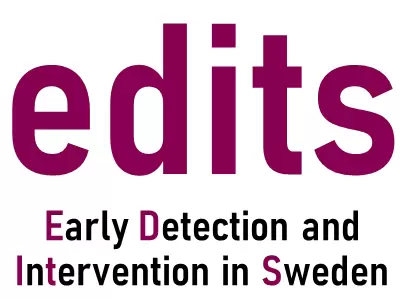Early Detection and Intervention in Sweden (Edits)
Improving healthcare provision during the early stages of psychosis has been proposed as critical to minimise the impact of prolonged illness on health and occupational outcomes. The Edits project will investigate the extent to which psychosis early intervention services have led to improved outcomes for people living with psychotic disorders and will develop predictive and prognostic models to identify people who might need these services most.

Psychotic disorders are severe mental illnesses characterised by distressing hallucinations and delusions. Due to their early age of onset, and typically chronic course, these disorders are often lifelong conditions which can significantly impact on quality of life and work ability.
Psychosis early detection and intervention services aim to improve long-term outcomes for people with psychosis by intervening during the early stages of illness. These services have recently been recommended in Sweden but have yet to be fully implemented, providing a unique opportunity to evaluate their potential impact and optimise delivery.
Led by an international team, the aims of this three-year project are to:
- Establish the real-world impact of early intervention services by comparing trends in key outcomes over time in countries that vary in the availability of these services but are otherwise comparable (Sweden vs. Denmark)
- Inform the implementation of these services in Sweden by developing predictive and prognostic models to support the delivery of personalised care to those in greatest need.
This project will yield findings that have the potential to improve the lives of people with psychosis and enable healthcare providers to optimise service provision.
Principal Investigator: Dr Alexis E. Cullen https://staff.ki.se/people/alexis-cullen
Duration: 2023-2026
Funder: Swedish Research Council (Vetenskapsrådet)
Study team
Investigators
- Alexis Cullen (Karolinska Institutet)
- Ellenor Mittendorfer-Rutz (Karolinska Institutet)
- Simon Cervenka (Uppsala University)
- Merete Nordentoft (Copenhagen Research Centre for Mental Health)
- Carsten Hjorthøj (Copenhagen Research Centre for Mental Health)
Collaborators
- Paolo Fusar-Poli (King’s College London)
- Philip McGuire (University of Oxford)
- Heidi Taipale (Karolinska Institutet)
- Nikolai Albert (Copenhagen Research Centre for Mental Health)
- Annette Erlangsen (Copenhagen Research Centre for Mental Health)
- Christopher de Montgomery (University of Copenhagen)
